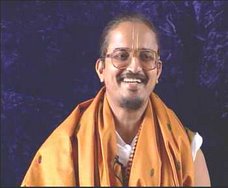Nama Article 11th January 2014
11th Jan to 19th Jan 2014 "Bhaktha Vijayam" Discourse by HH Maharanyam Sri Sri Muralidhara Swamiji – Narada Gana Sabha, Alwarpet – 6.30 PM onwards. All are welcome.
Today is Vaikunda Ekadasi
Excerpts from a discourse by our Sri Sri Muralidhara Swamiji
So, here what does Andal mean by saying 'the worship to be performed by us'? 'Nămum nam păvaikku'. She tells us also to take up the 'nonbu'. Even if one were not (living) during the period of 'păvai nonbu' one can do it mentally ('mănasîgama'). So, even if waking up early ('ushat kăl') in Mărgazhi month is a good tradition what is the practice followed by us? Swami Vivekananda explains excellently, "We always leave out what is important and take to that which is not of any 'săram' (importance)). What is the reason (for him saying so)? It is not enough if one wakes up early. One should wake up early and perform Năma Sankîrtanam/Bhagavat ărădhana. One says, 'I woke up at 3'o clock in Mărgazhi.' But on waking up watching T.V. or reading the newspaper is of no use. Once you wake up so early you must worship Bhagavăn ('Bhagavat ărădhana'). Once you wake up you must perform Năma Sankîrtanam. Similarly, mere fasting on Vaikunta Ekădasi is of no use. Along with the fast one should meditate on Bhagavăn ('Bhagavat dhyăna'). Why is fast ('upavăsam') ordained for that day? If one goes on fast the mind becomes one-pointed. 'Upa văsam' means to be (live) near Bhagavăn. So, it is not enough if we take hold of just the literal meaning ('sthula') but one should understand the underlying meaning ('sukshma') also.
Please check these: Excerpts from a discourse by our Sri Sri Muralidhara Swamiji
Performance of Nama kirtan during auspicious days will destroy these ten sinful errors
Every Ekadasi Akanda Namakirtan (Chanting Mahamantra from 6 am to 6 pm is done in most of our Namadwaars)
On auspicious days like Ekadasi people go on the streets singing the Divine Name of the Lord.
Every day in Marghazhi month and on Sundays people go on the streets singing the Divine Name of the Lord in all Namadwaars and GOD Satsangs
Every week people in hundres of GOD satsangs across the globe join and sing the Divine Names of the Lord
Chant the Mahamantra Nama kirtan :
Hare Rama Hare Rama Rama Rama Hare Hare
Hare Krishna Hare Krishna Krishna Krishna Hare Hare

No comments:
Post a Comment